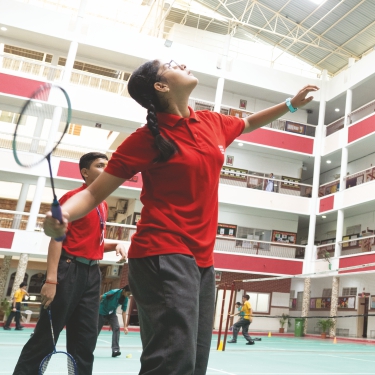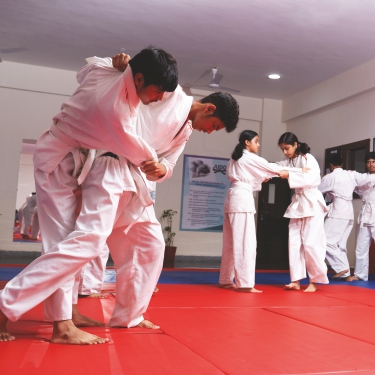MISSION
At the heart of our Advanced Sports Program is a dedicated mission to provide specialized training to young minds and maximize their athletic potential and skill acquisition. Our goal is to foster a vibrant community where every individual thrives in a safe and nurturing environment. Here at ASP, children are encouraged to explore their interests deeply, honing essential life skills such as teamwork, discipline, and resilience. Through personalized guidance and mentorship from specialized coaches, students not only excel in their chosen activities but also discover new talents and strengths. Our holistic approach ensures that every participant reaches their full potential, equipping them with the confidence and capabilities to succeed both on and off the field.
HIGHLIGHTS
- Timings: 2:15 pm to 4:00 pm on all academic working days.
- Participants: Open to students from Class III to XI.
- Nutrition: Nutritious snacks provided for all students.
- Coaching Excellence: Led by specialized and qualified coaches
- Event Participation: Assistance provided for CBSE Games, SGFI, State-level, and National-level competitions like Kala Utsav and Bal Rang.
- Year-long Commitment: Choose one activity to focus on throughout the year.
- Transport: Complimentary transport facility available.
Join us in creating memorable experiences and nurturing the champions of tomorrow!

Basketball
- Skill Development: Focus on teaching fundamental basketball skills, including dribbling, passing, shooting, ball-handling, and defensive techniques.
- Technique Refinement: Work on refining and improving players' techniques, including shooting form, layups, free throws, and defensive positioning.
- Physical Conditioning: Incorporate fitness and conditioning drills to improve players' endurance, speed, agility, strength, and overall physical fitness.
- Footwork and Agility: Emphasize footwork, balance, and agility drills to enhance players' movement on the court.
- Offensive and Defensive Strategies: Provide Training on offensive and defensive strategies, including plays, transitions, and game management.

Badminton
- Skill Development: Focus on teaching fundamental badminton skills, including grip, footwork, racket control, and shot techniques (e.g., clears, smashes, drops).
- Technique Refinement: Work on refining and improving players' techniques, emphasizing proper form, shot placement, and consistency.
- Footwork and Agility: Incorporate drills and exercises to enhance players' footwork, agility, speed, and overall physical conditioning.
- Singles and Doubles Play: Provide training in both singles and doubles play, teaching strategies and tactics for both formats of the game.
- Match Strategy: Teach players how to strategize and adapt their game plan for different opponents and situations.

Cricket
- Fundamental Skill Development: Focus on building fundamental cricket skills, batting, bowling, fielding and wicket keeping, starting with the basics.
- Technique Refinement: Work on refining and improving players' cricketing techniques, including proper grip, stance, footwork, and shot selection.
- Game Strategy: Teach players the tactical aspects of the game, such as field placements, running between the wickets and match strategies.
- Net Practice: Organize regular net practice sessions to allow players to hone their skills in a controlled environment.
- Match Simulations: Arrange practice matches to help players gain real-game experience and apply their learning in a competitive setting.
- Professional Training: Through use of leather balls for improved skill development.
- Safety Measures: Emphasize the importance of safety by wearing helmets, pads, gloves and abdominal guards.

Football
- Skill Development: Focus on teaching fundamental football skills, including dribbling, passing, shooting, ball control and tackling.
- Technique Refinement: Work on refining and improving players' techniques, such as passing accuracy, shot placement and defensive positioning.
- Tactical Understanding: Teach players the strategic aspects of the game, including offensive and defensive strategies, formations and game management.
- Small-Sided Games: Utilize small-sided games and drills to help players develop decision-making skills and improve their ability to read the game.
- Fitness and Conditioning: Include fitness and conditioning drills to improve players' endurance, speed, agility, strength and overall physical fitness.

Judo
- Fundamental Techniques: Focus on teaching fundamental judo techniques, such as throws, pins, joint locks, and strangles, emphasizing proper form and execution.
- Technique Refinement: Work on refining and perfecting players' techniques, including timing, balance, and control.
- Physical Fitness: Incorporate conditioning exercises to enhance players' strength, flexibility, endurance, and overall physical fitness.
- Safety Measures: Prioritize safety by teaching participants how to fall properly (ukemi) and perform techniques safely to prevent injuries.
- Randori (Fights): Organize controlled fight sessions (randori) to allow players to apply their skills in a controlled and dynamic environment.

Skating
- Fundamental Skills: Focus on teaching fundamental skating skills, including balance, coordination and basic maneuvers like gliding and stopping.
- Technique Development: Work on refining and improving skating techniques, including advanced moves like crossovers, transitions, and jumps, as participants progress.
- Safety Measures: Prioritize safety by teaching participants how to fall safely, wear appropriate protective gear (helmets, pads, gloves), and follow safety guidelines.
- Freestyle and Artistic Elements: Offer training in freestyle and artistic skating elements, allowing participants to express themselves creatively on the rink.
- Routines and Choreography: Teach participants to create and perform skating routines, helping them develop performance and showmanship skills.

swimming
- Fundamental Skills: Focus on teaching fundamental swimming skills, including water confidence, breath control and basic strokes (freestyle, backstroke, breaststroke, butterfly).
- Stroke Development: Work on refining and improving swimming techniques, including proper body position, stroke efficiency, and breathing techniques.
- Water Safety: Prioritize water safety by teaching participants how to float, tread water, and perform water rescues if needed.
- Fitness and Conditioning: Incorporate conditioning exercises to improve participants' stamina, strength, and overall physical fitness in the water.
- Competitive Swimming: Provide training for participants interested in competitive swimming, including race preparation, turns and starts.

Tennis
- Fundamental Skills: Focus on teaching fundamental tennis skills, including grip, stance, footwork, and basic strokes (forehand, backhand, volley, serve).
- Technique Refinement: Work on refining and improving players' techniques, emphasizing shot placement, spin, and control.
- Tactical Understanding: Teach participants the strategic aspects of tennis, including game strategy, point construction, and shot selection.
- Physical Conditioning: Incorporate fitness and conditioning exercises to improve players' endurance, speed, agility, and overall physical fitness.
- Match Play: Organize practice matches and tournaments to allow players to apply their skills and tactics in a competitive environment.


